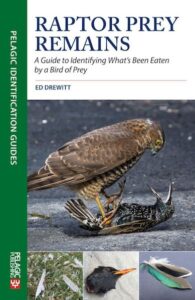Mark Avery must have been somewhat busy this past week, as he only posted two books for this week’s Sunday Book Review – and the two books he chose are as different as cheese and chalk.
 First up, he examines James Rebanks’ English Pastoral; an Inheritance from Allan Lane. Mr. Rebanks’ previous book, The Shepherd’s Life; A Tale of the Lake District, was Mark’s 2015 Book of the Year. A three-part reflection upon the Cumbrian farm where the author was born, Mark describes this new work as the journey of “a farmer who gets what nature conservationists have said about farming for years. He accepts that modern farming has damaged soils, reduced wildlife and increased flood risk whilst not being great for animal welfare and yet producing cheap food for us all.” (On a disappointing note, while presently available in the UK, readers in the US must wait until well into next spring for the American edition of English Pastoral to be published by Custom House Books.)
First up, he examines James Rebanks’ English Pastoral; an Inheritance from Allan Lane. Mr. Rebanks’ previous book, The Shepherd’s Life; A Tale of the Lake District, was Mark’s 2015 Book of the Year. A three-part reflection upon the Cumbrian farm where the author was born, Mark describes this new work as the journey of “a farmer who gets what nature conservationists have said about farming for years. He accepts that modern farming has damaged soils, reduced wildlife and increased flood risk whilst not being great for animal welfare and yet producing cheap food for us all.” (On a disappointing note, while presently available in the UK, readers in the US must wait until well into next spring for the American edition of English Pastoral to be published by Custom House Books.)
 Then, moving from lyrical reflections into grizzly imagery, Mark’s second review this Sunday takes up Ed Drewitt’s Raptor Prey Remains; A Guide to Identifying What’s Been Eaten by a Bird of Prey (a book to which I would have given the Ishiguro-homage title The Remains of the Prey). Published by Pelagic Press, this book is exactly what it’s title declares: “images of bits of over 100 species, mostly birds, that you might find in raptor nests or on plucking posts.” While declaring himself not to exactly fit the category of reader to whom this book would be most interesting, he nevertheless find the book to be an important and very useful one, noting “there are hundreds […] of people who will want this book and we should all thank both the author and publisher for providing this reference book based on the expertise of the author. It comes close to being a public service as it encapsulates the author’s knowledge, masses of work has gone into it.”
Then, moving from lyrical reflections into grizzly imagery, Mark’s second review this Sunday takes up Ed Drewitt’s Raptor Prey Remains; A Guide to Identifying What’s Been Eaten by a Bird of Prey (a book to which I would have given the Ishiguro-homage title The Remains of the Prey). Published by Pelagic Press, this book is exactly what it’s title declares: “images of bits of over 100 species, mostly birds, that you might find in raptor nests or on plucking posts.” While declaring himself not to exactly fit the category of reader to whom this book would be most interesting, he nevertheless find the book to be an important and very useful one, noting “there are hundreds […] of people who will want this book and we should all thank both the author and publisher for providing this reference book based on the expertise of the author. It comes close to being a public service as it encapsulates the author’s knowledge, masses of work has gone into it.”
 Links to Mark Avery’s Sunday book reviews appear in The Well-read Naturalist by special arrangement. You can find all of Mark’s past reviews as well as a wide-ranging collection of his other writings on his Standing Up for Nature website. Mark’s opinions regarding the books he reviews are his own.
Links to Mark Avery’s Sunday book reviews appear in The Well-read Naturalist by special arrangement. You can find all of Mark’s past reviews as well as a wide-ranging collection of his other writings on his Standing Up for Nature website. Mark’s opinions regarding the books he reviews are his own.
